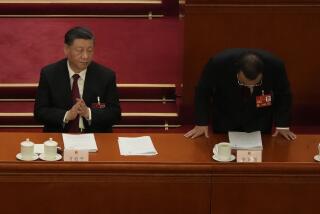Would Deng’s Death Unleash Bulls or Bears? : China: The failing health of the 88-year-old patriarch prompts new speculation over the future of Hong Kong’s markets.
- Share via
HONG KONG — China’s senior leader Deng Xiaoping is going to die someday. About that, everyone is certain.
But with speculation now swirling around the Hong Kong stock market regarding the deteriorating health of the 88-year-old patriarch, the ghoulish business of assessing the likely market impact of Deng’s passing has begun once more. This isn’t new. Deng’s “imminent” demise has been the stuff of market-moving rumors for the better part of a decade.
Still, analysts are once again spinning post-Deng era market scenarios. And a case is being made that the passing of the supreme leader, rather than spooking the market, could be bullish for stocks if China’s political transition goes smoothly.
“Deng Xiaoping’s death is going to be the last big buying opportunity in Hong Kong before 1997 (when Hong Kong reverts to Chinese rule),” said David Whittall, investment analyst at Baring Securities in Hong Kong.
“If the army moves in (after his death), investors will be sidelined. But if Jiang Zemin (China’s president and general secretary of the Communist Party) and the current leaders seem secure, people are going to buy,” he said.
Indeed, investors are more likely to react to Beijing’s efforts to control the torrid growth of the Chinese economy. While Deng’s reputation is legendary, his actual political clout these days is uncertain.
Should Deng’s passing come in the next couple of weeks, it won’t catch many investors off guard. The leader’s death has been so thoroughly anticipated that while it may drag down stocks in the short term, it won’t have much long-range impact.
“If it happened tomorrow, we’d be down about 600 points and maybe stay around 6,000 for two weeks after that,” said Barry Yates, director at Vickers Ballas brokerage. “But it wouldn’t be a disaster; it would be a buying opportunity. People would buy at those levels.”
One reason is that China’s economy--growing at an astounding 14% annual clip this year--is the world’s fastest-growing. Though the danger is real that it might overheat in the coming months, China is likely to be a hot investment play for some time to come.
To be sure, should political developments in China take a sudden and nasty turn, investors in Hong Kong would certainly feel some pain.
The Tian An Men Square crackdown in June, 1989, when troops came into Beijing and violently cleared protesters from the streets, sent the territory’s bourse into a tailspin. The day after the crackdown, the Hang Seng index of top shares plunged 22%.
“Tian An Men Square was totally unexpected. Deng’s death certainly isn’t,” Whittall said. “Deng Xiaoping is part of the risk premium investors put in this market,” he said.
Although brokers now hesitate to guess how much the Hang Seng index would drop on news of Deng’s death, they all agree that the consequences will be short-lived.
“Clearly, Deng’s death is going to cause some short-term losses,” said Richard Margolis, director at Smith New Court (Far East) brokerage. “There’s a tendency to regard Deng as the man who is propping the good things up. But people have already adjusted to the idea that he is not functioning.”
Should Deng’s day come, much of the market reaction will turn on how the inevitable power struggles play out among the rival factions in Beijing.
In other words, the problem is not so much Deng’s death as the lack of organized means of transferring power in China from one generation to the next.
“How the Hong Kong markets take the blow depends on how fast Beijing can react,” said Richard Wong, investment manager at Wardley Investment Services. “We’re likely to see some sort of collective ruling body and if they seem in control, investors will relax.”
“The headlines will cause a drop in investor confidence,” said Baring’s Whittall. “But shortly after that, investors will come in very quickly. Deng’s death means that the last of the political ideologues would have died, and that will give China the freedom to move forward more quickly. “
Bullish on Hong Kong
Hong Kong stocks, as measured by the Hang Seng index of issues on the Hong Kong Stock Exchange, have enjoyed strong gains in the past year, reaching an all-time high in May, 1993. Monthly closings:
Friday’s close: 7,396.77
Note: The Hang Seng index is a capitalization-weighted index of 33 companies that represent about 70% of the total market capitalization of the Hong Kong Stock Exchange.
Source: Bloomberg Business News
More to Read
Inside the business of entertainment
The Wide Shot brings you news, analysis and insights on everything from streaming wars to production — and what it all means for the future.
You may occasionally receive promotional content from the Los Angeles Times.










